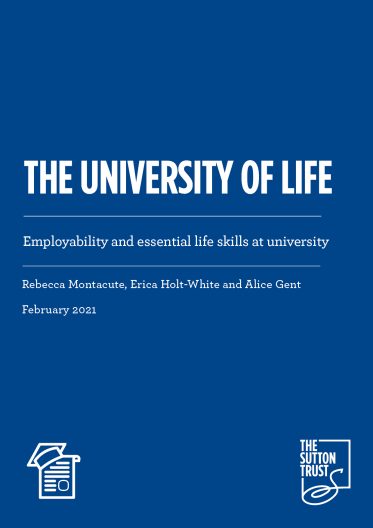Participation
• Students take part in a wide range of activities outside of their core academic work at university. For recent graduates, carrying out paid work at university was common (79%), as was participation in student societies (61%). Many had also taken part in work experience (43%),but only a small proportion (12%) studied abroad during their degrees.
• However, participation differs substantially by socio-economic background. Just over half (52%) of recent graduates from working class backgrounds took part in student societies, compared to almost two thirds (64%) of better-off students. There is a similar gap in participation for work experience placements (36% vs 46%) and study abroad (9% vs 13%).
• Paid work is equally common for students from all socio-economic backgrounds, but graduates from working class backgrounds were more likely to have worked alongside periods of study, including in their final year, during term time and during exam periods.
Development of essential life skills at university
• While many graduates felt their university course had helped them to develop life skills such as communication (62%) and resilience (53%), fewer than half (43%) felt it had developed their motivation, and less than a quarter (24%) felt it helped them to develop leadership skills.
• Many of the skills not developed well by a student’s course were developed by other activities, although there was a great deal of variation between them. This variability in skills development across different activities shows the importance of students taking part in a wide range of pursuits during their degree.
Barriers to participation
• The most common reason students did not take part in work experience was because their university or course did not give them an opportunity to do so (39%). This proportion was higher for graduates of Pre and Post 1992 institutions (41% at both, compared to 36% of graduates from Russell Group universities).
• Cost was often a barrier for working class graduates. 1 in 5 (20%) of working class graduates who did not take up a work experience placement during university could not afford to, for example because of a need to spend the time in better paid employment or due to the cost of commuting. This compared to 15% of better-off graduates citing the same barrier.
• A third (32%) of those who did not take part in extra-curricular activities could not due to paid work commitments.
• 34% of students reported they were living at home with their family while attending university, with consequent impacts on their experience of university life. Two thirds (66%) of those living away from home took part in extra-curricular activities, compared to 38% of those in their family home. Students from working class backgrounds were substantially more likely to be living at home during term.
How well do universities develop employability skills?
• Over a quarter of graduates (29%) did not feel that university had given them the skills they needed to get hired in the jobs they wanted after graduation. This figure was higher for students from working class backgrounds (33% vs 27% of better off students), and students at Post-1992 (32%) and Pre-1992 (29%) institutions, compared to those who attended universities in the Russell Group (25%).
• While 52% of those from better-off backgrounds felt they had sufficiently developed skills in finding the right jobs and opportunities. However, a far lower proportion (44%) of their peers from poorer backgrounds said the same.
